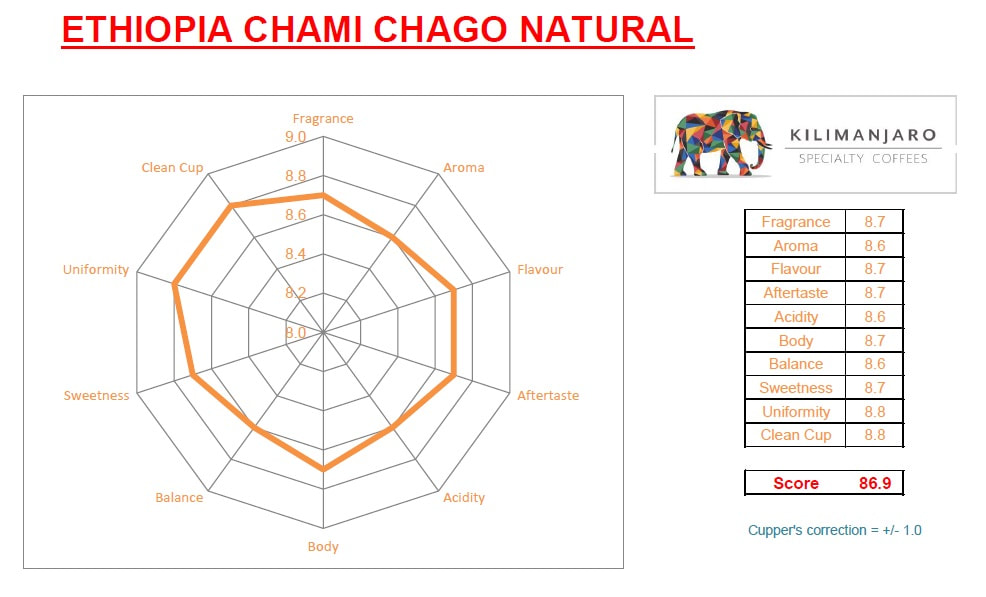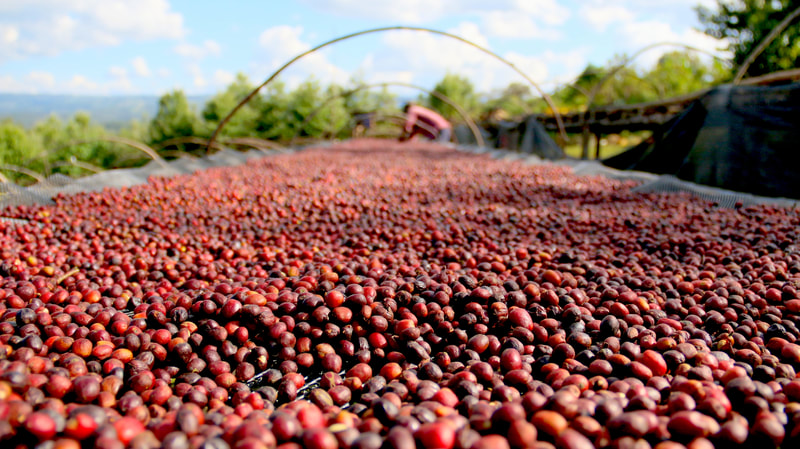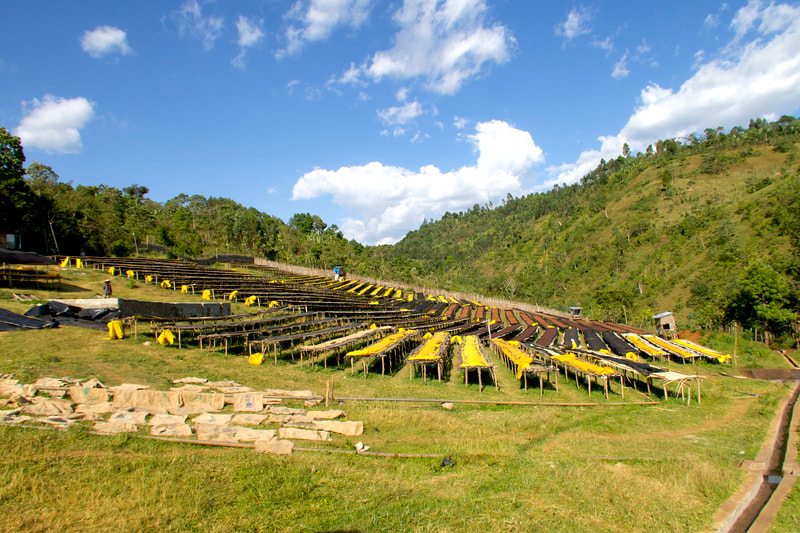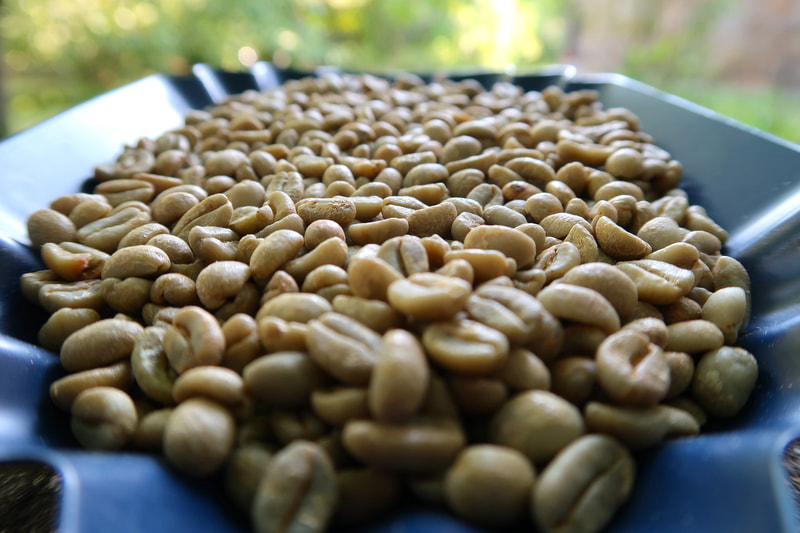ETHIOPIA Chami chago NATURAL
General Information
|
Origin: Ethiopia
Region: Goma District, Jimma Cooperative: Chami Chago Sundried Station: Chami Chago Cultivars: Metu Bishari Selection (including varieties: 74110, 74112, 74140, 74148 & 74165) Altitude: 1980 - 2100 masl Process: Sun-dried on African beds Harvest: December 2020 - February 2021 Grade: 1 Cherry Price | FOB Price: 3.28 USD/Kg | 6.51 USD/Kg Screen | Moisture | Density: 14+ | 10.1% | 0.691 g/ml Packaging: 60 Kg + GrainPro Score: 86.9 Notes: Blueberries, pineapple, chocolate, caramel Ikawa Roasting Profile: Coffeequest #2 |
TRACEABILITYChami Chago is the newest cooperative of the Kata Muduga Union and it was established last year. Partnering with Kata Maduga has allowed us to develop the initiative to work directly at a cooperative level in different regions of southwestern Ethiopia.
The Union administers and coordinates the agronomists and managers for each of the 33 cooperatives which they work with, but also has an assigned business advisor who helps the cooperative manage its debt, reinvest in quality improvements in the factory and verifies the distribution of the income for all its members (coffee farmers). Chami Chago is a small cooperative compared to other excellent cooperatives in the Jimma region. It has a total of 220 members, of which 209 are male and 11 female. This is a natural processed lot that has impressed us on the cupping table for its sweetness and cleanliness, as well as with its intense notes of blueberry and pineapple. COFFEE: A MATTER OF STATE IN ETHIOPIAEthiopia is an extraordinary and complex origin, probably the most complex. It is also a diverse and dispersed workplace. One must invest a lot of time in travel, cuppings and research, to collect lost bits of information and try to understand its coffee industry, through its culture, history, geography, economy and politics.
Coffee is so important to Ethiopia that it alone supports the Trade Balance of a country with more than 100 million inhabitants. It is the main source of foreign currency income, reaching record sales of USD 917 million in 2018. In addition, it is estimated that 15 million people depend directly on coffee production to survive. Since Ethiopia's economy is highly dependent on imports, its trade balance is permanently negative, this means that there is a constant deficit of dollars in the fiscal and private coffers. For this reason, there are many actors not related to the coffee industry involved in it, and many others wanting to join. Approximately 40% of the export price is lost in the hands of unnecessary intermediaries, in the production and logistics process. Since 2017, the coffee industry in Ethiopia has allowed direct sales to importers through washing stations. Before, everything had to be traded through the Ethiopia Commodity Exchange (ECX). The ECX is equivalent to the Nairobi Coffee Exchange, but inefficient and poorly organized; where batches are mixed across large production areas and therefore traceability and quality are generally lost or degraded. 90% of Ethiopian coffee is produced by small coffee growers, who deliver their cherries to the washing stations closest to their farms. These washing stations are organized in two ways, either they are bought by private agents or they are grouped in cooperatives. The private agents are exporters and the cooperatives are again grouped in Unions, which function as an “umbrella” organization, providing support in important areas of marketing, production, financing and logistical support. At Kilimanjaro Specialty Coffees we work only with Cooperative Unions, and not with private agents. This means that we have access to first-hand information when cupping and selecting lots, transparency regarding the costs and finances of the Union, more traceability, fewer unnecessary intermediaries and we generate a greater socioeconomic impact for the coffee grower and their communities. VARIETIES AND HEIRLOOMAccording to the Cambridge dictionary, the word "Heirloom" has the following meanings:
1.- valuable object that the older members of a family have given to the younger members of the same family for many years. 2.- a fruit, plant or seed of a type, which has existed for many years. An "Heirloom" variety is a plant variety that has a history of transfer within a family or community, similar to the generational exchange of heirloom jewellery or furniture. From a macro botanical point of view, an Heirloom variety must be open pollinated. The Arabica species is a self-pollinated crop, therefore, from a conceptual point of view, the term "Heirloom" does not apply to the Arabica species. For many years in the coffee industry, the word Heirloom has been used in Ethiopia, as a generic term to describe a variety or group of unknown cultivated varieties of a particular lot, farm or region, which over the years has been planted and passed from one coffee producer to the next. Ever since the specialty coffee movement began to grow around the world, there was an obvious need for traceability and information. Although the Jimma Agricultural Research Center (JARC) has been working since the 1970s on research and development of new varieties, importers have had limited access to this information to describe the varieties of the coffees they were buying from Ethiopia. Today, thanks to professionals like Getu Bekele and more, who have been studying the wild and cultivated varieties of Ethiopia for decades, we can recognize and differentiate two large groups of Ethiopian coffee varieties: the regional varieties and the varieties improved by the JARC. We can say that there are between 6,000 and 10,000 regional varieties and the JARC has developed around 60 improved varieties, which have been distributed among coffee growers throughout the country. These improved varieties address the problems of CBD, rust, cup quality and yield, and today they are widely used in all coffee growing regions of Ethiopia. For example, if we analyse the Jimma region, we can learn that the improved varieties of the area belong to the 1974/75 Metu Bishari selection, where we find the varieties: 74110, 74112, 74140, 74148 and 74165. The regional varieties found in this area they include: Kuburi, Bedessa, Yawan and Dalacha, among others. Each coffee region in Ethiopia today has a completely specific set of improved varieties and regional varieties, adapted to the unique conditions of each area. |
WASHED V/S NATURAL
chami chago CDS LOCATION
|
WHERE WE ARE
Barcelona, Spain Santiago, Chile Budapest, Hungary |





